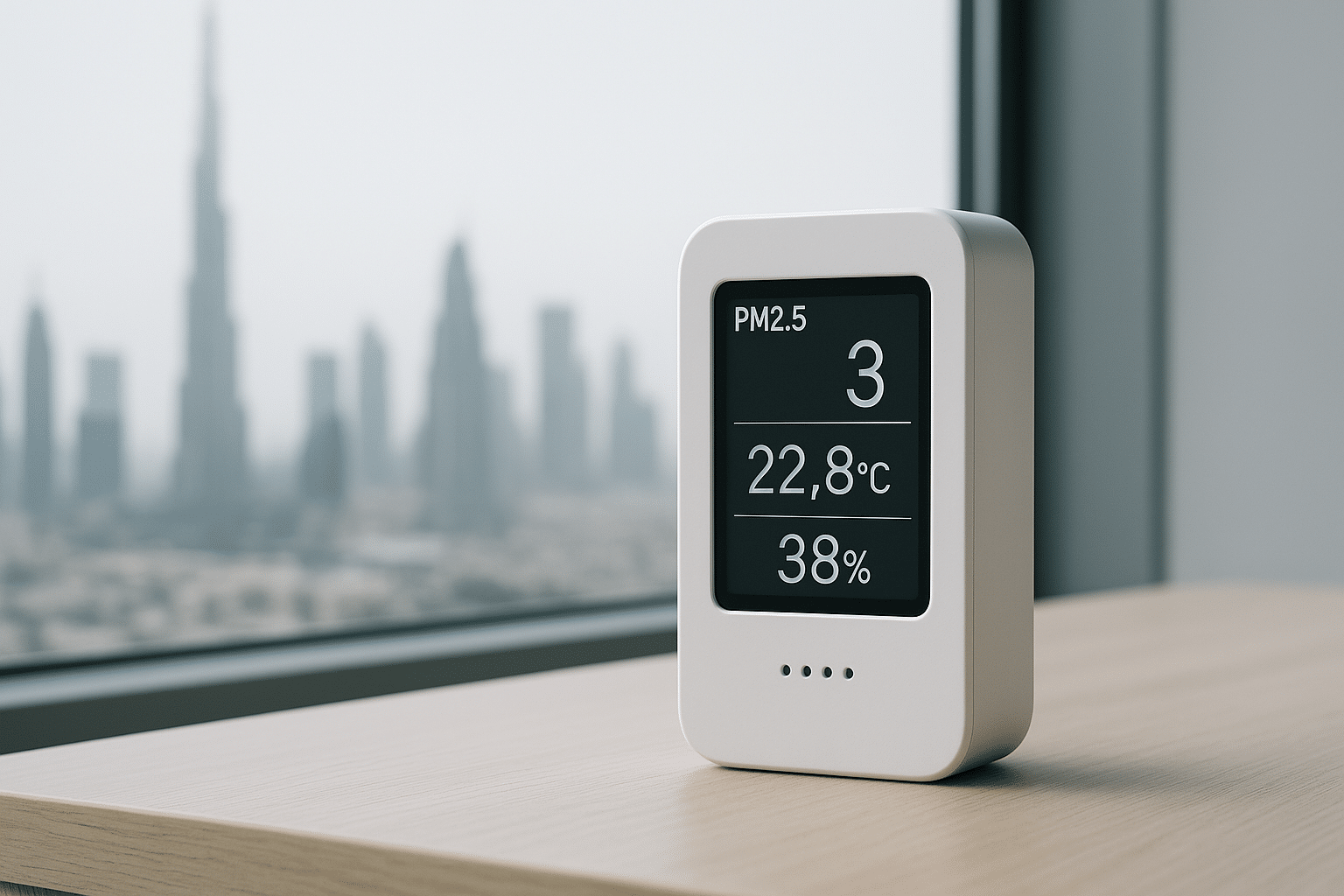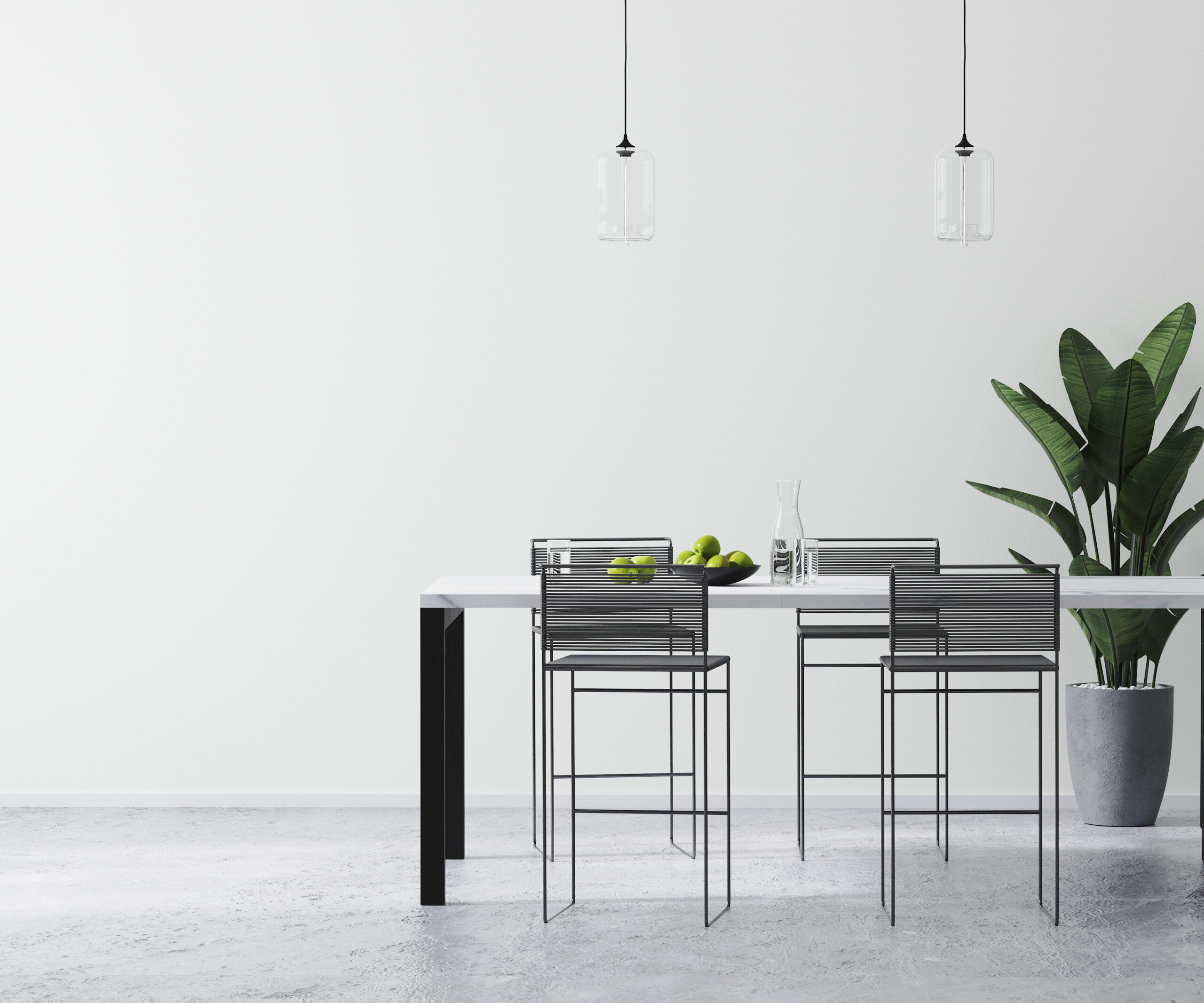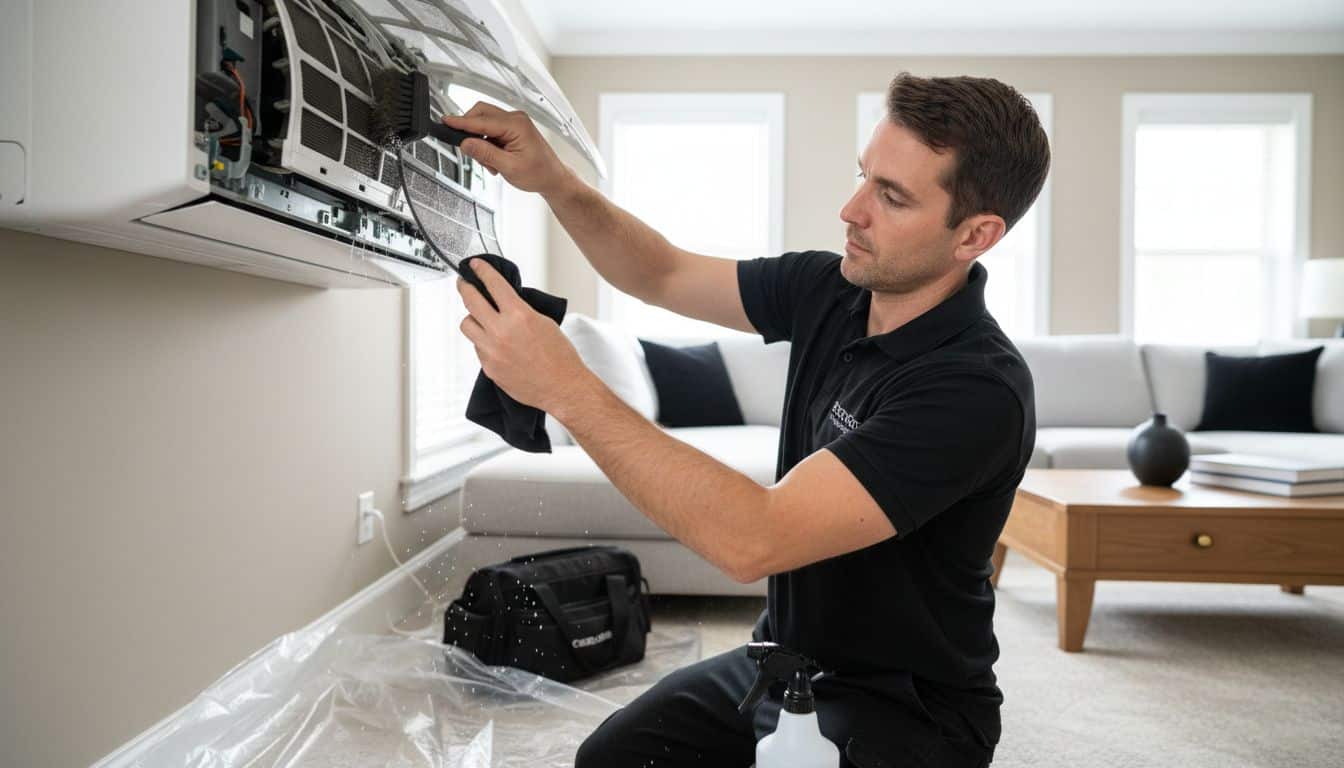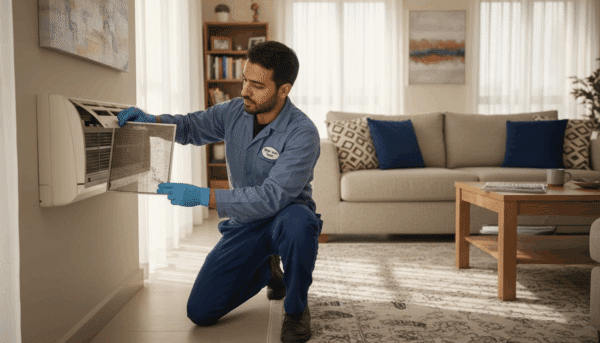
10 Smart Tips for Indoor Air Quality Monitoring Services Dubai: Improve Your Home and Office Environment
Table of Contents
Contents
- 1 Table of Contents
- 2 Importance of Indoor Air Quality
- 3 Understanding Indoor Air Quality Monitoring
- 4 Benefits of Indoor Air Quality Monitoring Services Dubai
- 5 Key Tips for Improving Indoor Air Quality in Dubai
- 5.1 1. Regular Monitoring with Professional Services
- 5.2 2. Optimize Ventilation Systems
- 5.3 3. Control Humidity Levels
- 5.4 4. Use Air Purifiers with Activated Carbon Filters
- 5.5 5. Regular Cleaning and Maintenance
- 5.6 6. Use Low-Emission Products
- 5.7 7. Houseplants for Natural Air Filtration
- 5.8 8. Educate Occupants on Indoor Air Quality
- 5.9 9. Monitor Outdoor Air Quality
- 5.10 10. Schedule Seasonal Checks
- 6 Frequently Asked Questions About Indoor Air Quality Monitoring Services Dubai
- 6.1 Q1: How often should indoor air quality be monitored in Dubai properties?
- 6.2 Q2: Are indoor air quality issues common in Dubai?
- 6.3 Q3: Can indoor air quality affect productivity at Dubai workplaces?
- 6.4 Q4: What authority regulates indoor air quality in Dubai?
- 6.5 Q5: How do I choose the right indoor air quality monitoring service?
- 7 Choosing the Best Indoor Air Quality Monitoring Service in Dubai
- 8 The Future of Indoor Air Quality Monitoring in Dubai
- 9 Conclusion and Call to Action
Indoor air quality is a critical yet often overlooked aspect of healthy living and workplace productivity, especially in a bustling metropolis like Dubai. With rapid urbanization, construction, and environmental factors such as desert dust and extreme heat, maintaining optimal indoor air conditions is essential. Indoor air quality monitoring services Dubai provide tailored solutions to help residential, commercial, and industrial sectors ensure safer, cleaner environments. These services are growing increasingly vital as awareness of air pollution’s impact on health rises alongside regulatory frameworks developed by authorities like Dubai Municipality and Dubai Health Authority (DHA).
Importance of Indoor Air Quality
Indoor air quality plays a pivotal role in maintaining healthy living and working environments, especially in Dubai’s unique climate conditions. Indoor air quality monitoring services Dubai have become increasingly vital as residents and businesses seek to control pollutants that can affect respiratory health, productivity, and overall wellbeing. From desert dust and humidity to indoor pollutants like VOCs (volatile organic compounds), monitoring is essential to safeguard air quality.
Living and working spaces in Dubai, such as homes in Arabian Ranches or office towers in Business Bay, require constant attention to the air people breathe. Regulatory authorities like Dubai Municipality have established standards to help improve air quality, but practical measures and professional monitoring services fill the critical gap in everyday life.
Dubai’s climate and urban landscape create distinctive challenges for indoor air quality. The city experiences frequent dust storms, a high reliance on air conditioning, and diverse indoor activities that can introduce pollutants. All these factors combine to influence the internal air conditions in homes, offices, healthcare facilities, and hospitality establishments.
Poor indoor air quality can lead to various health issues, including respiratory problems, allergies, headaches, fatigue, and long-term complications such as asthma or cardiovascular concerns. The situation is particularly critical in sensitive environments such as hospitals and schools where vulnerable populations spend considerable time.
Monitoring indoor air quality allows residents and businesses to take proactive steps tailored to the specifics of Dubai’s environment. It helps identify sources of pollutants like particulate matter (PM2.5, PM10), volatile organic compounds (VOCs), carbon monoxide (CO), carbon dioxide (CO2), humidity levels, and microbial contaminants. By analyzing these parameters, indoor air quality monitoring services Dubai assist in creating healthier indoor spaces aligned with local standards, such as those set by Dubai Municipality’s Green Building Regulations and the Dubai Health & Safety guidelines.
Understanding Indoor Air Quality Monitoring
Indoor air quality monitoring services Dubai involve the use of specialized devices to detect and measure pollutants such as carbon dioxide, carbon monoxide, particulate matter (PM2.5 and PM10), humidity, temperature, and VOCs. These readings provide a comprehensive picture of the air environment within residential and commercial properties.
Advanced monitoring technology enables early detection of air contaminants, facilitating timely intervention. For instance, monitoring air quality helps building managers in Dubai Marina or Downtown Dubai quickly identify and manage sources of indoor pollution, like mold, dust buildup, and chemical fumes from cleaning products.
Monitoring is not a one-time activity but an ongoing process that supports sustainable air quality management aligned with Dubai’s health and safety regulations.
Professional indoor air quality monitoring services Dubai integrate advanced technology with expert analysis to provide actionable insights. The process generally includes:
- Real-time Air Sampling: Using portable or fixed sensor devices, continuous sampling of air pollutants and environmental parameters is conducted throughout the monitored area. This provides timely detection of any fluctuations or problematic spikes in harmful substances.
- Laboratory Testing: In some cases, air samples are collected for laboratory analysis to identify microscopic contaminants like mold spores and bacteria, which standard sensors might not detect fully.
- Consultation and Data Interpretation: Beyond data collection, specialists interpret findings with reference to Dubai’s regulatory guidelines, the UAE Fire & Life Safety Code, and industry-specific requirements. This step is crucial for recommending mitigation strategies applicable to local conditions.
Deploying a combination of sensors and expert evaluations enables clients across Dubai — from residential towers in Business Bay to healthcare facilities in Al Wasl — to obtain detailed insights into air quality dynamics. This comprehensive approach is necessary to address the diverse pollution sources prevalent in Dubai, including building materials, cleaning agents, cooking emissions, and HVAC system performance. Therefore, choosing the right indoor air quality monitoring services Dubai is paramount.
Benefits of Indoor Air Quality Monitoring Services Dubai
Employing indoor air quality monitoring services Dubai goes well beyond mere compliance with regulations. It offers multiple tangible benefits that contribute to the wellbeing of occupants and the operational efficiency of buildings:
- Health Protection & Safety Assurance: Continuous monitoring helps detect harmful substances early, preventing respiratory issues, allergies, and other health problems common in desert climates. It also supports compliance with Dubai Municipality and DHA’s health standards, especially critical in public-facing facilities like malls and hotels in Dubai Marina and Downtown Dubai. Effective indoor air quality monitoring services Dubai contribute significantly to these health outcomes.
- Regulatory Compliance: Ensures conformity with Dubai Municipality and Dubai Health Authority guidelines, helping businesses avoid penalties. This is a core offering of professional indoor air quality monitoring services Dubai.
- Energy Efficiency & Comfort: Informed air management reduces unnecessary HVAC usage, cutting energy consumption in Dubai’s hot environment. Monitoring air quality parameters such as humidity and CO2 levels allows for optimized HVAC system control—balancing fresh air intake and energy consumption. This results in cost savings and improved comfort for residents and employees in areas such as Nad Al Sheba and Arabian Ranches.
- Improved Comfort: Balanced humidity and clean air enhance occupant comfort in homes located in Nad Al Sheba or offices in Jumeirah Lakes Towers. This makes indoor air quality monitoring services Dubai an investment in occupant wellbeing.
- Increased Property Value: Well-monitored and maintained indoor air quality enhances real estate appeal in competitive Dubai neighborhoods. Properties equipped with indoor air quality monitoring technologies appeal more to tenants and buyers seeking healthy living and working spaces. Businesses demonstrating adherence to Dubai Health & Safety protocols gain a competitive edge in the real estate and commercial sectors.
- Tailored Solutions for Diverse Sectors: Whether for a school in Al Barsha ensuring children’s respiratory health or a restaurant in Jumeirah safeguarding food quality, customized monitoring services provide data-driven recommendations aligned with sector-specific compliance needs in Dubai. Such tailored indoor air quality monitoring services Dubai are essential.
Key Tips for Improving Indoor Air Quality in Dubai
Implementing the right strategies reinforces the value of indoor air quality monitoring services Dubai. Here are practical tips tailored for Dubai’s unique environment:
Indoor air quality monitoring is most effective when combined with proactive air quality management strategies. Dubai-based building and facility managers often incorporate the following preventive measures based on monitoring data:
1. Regular Monitoring with Professional Services
Engage trusted indoor air quality monitoring service providers such as Saniservice in Dubai to conduct frequent assessments using real-time sensors. Opting for professional indoor air quality monitoring services Dubai ensures accuracy and adherence to local standards.
2. Optimize Ventilation Systems
Proper ventilation is vital. Utilize mechanical ventilation equipped with HEPA filters to reduce dust and outdoor pollutants, especially in high-traffic areas like Dubai Marina or Downtown offices.
3. Control Humidity Levels
Maintain indoor humidity between 40% and 60% to prevent mold growth amid Dubai’s humid seasons, using dehumidifiers or humidifiers as needed.
4. Use Air Purifiers with Activated Carbon Filters
Purifiers that target VOCs and particulate matter help combat indoor air contaminants from furnishings and cleaning products. Deploying HEPA filters, UV air purifiers, and activated carbon filtration systems addresses particulate and chemical pollutants, improving air quality in hospitals, offices, and luxury villas in Dubai’s high-density districts.
5. Regular Cleaning and Maintenance
Routine dusting and vacuuming with HEPA-filter vacuums reduce allergens. HVAC systems should be inspected and cleaned by certified technicians following Dubai Municipality’s health and safety regulations. Scheduled cleaning and filter replacements aligned with monitoring feedback ensure air conditioning systems operate efficiently, preventing accumulation of dust and microbial buildup—a significant issue given Dubai’s dusty environment.
6. Use Low-Emission Products
Choose paints, adhesives, and cleaning agents with low VOCs to minimize chemical pollutants indoors. Selecting construction and finishing materials compliant with Dubai Municipality’s green building standards minimizes the introduction of volatile organic compounds indoors.
7. Houseplants for Natural Air Filtration
Certain plants, like spider plants or peace lilies, can help improve air quality indoors, but they should be maintained properly to avoid mold. Leveraging bio-filtration through selected indoor plants can support air purification, complementing mechanical systems in offices and residential settings.
8. Educate Occupants on Indoor Air Quality
Make occupants aware of pollution sources and encourage habits such as no smoking indoors and reducing use of aerosols.
9. Monitor Outdoor Air Quality
Track outdoor pollution levels in Dubai’s busy areas and adjust indoor ventilation accordingly to minimize pollutant ingress.
10. Schedule Seasonal Checks
With Dubai’s climate shifts, regular seasonal air quality checks ensure homes and offices remain safe and comfortable year-round. These checks are often provided by leading indoor air quality monitoring services Dubai.
Frequently Asked Questions About Indoor Air Quality Monitoring Services Dubai
Q1: How often should indoor air quality be monitored in Dubai properties?
Routine monitoring is recommended quarterly for most residential properties, with monthly or continuous monitoring advisable in commercial or sensitive environments.
Q2: Are indoor air quality issues common in Dubai?
Yes, factors like dust storms, humidity fluctuations, and urban pollution make indoor air quality monitoring essential in Dubai to protect health and comfort. This underlines the importance of reliable indoor air quality monitoring services Dubai.
Q3: Can indoor air quality affect productivity at Dubai workplaces?
Absolutely. Poor air quality leads to fatigue and reduced cognitive functions. Maintaining optimal conditions enhances employee wellbeing and productivity, a key benefit of utilizing indoor air quality monitoring services Dubai.
Dubai Municipality, Dubai Health Authority (DHA), and Dubai Health & Safety departments establish guidelines and standards for air quality management.
Q5: How do I choose the right indoor air quality monitoring service?
Look for providers with certified equipment, local expertise, good reputations, and clear reporting methods. Services like Saniservice specialize in Dubai market needs.
Choosing the Best Indoor Air Quality Monitoring Service in Dubai
Finding a reliable indoor air quality monitoring services Dubai provider involves assessing their technology, response times, and local understanding. Companies like Saniservice offer Dubai-exclusive service coverage with compliance to Dubai Municipality standards. Their expertise includes tailored monitoring solutions for residential complexes in Arabian Ranches, commercial buildings in Business Bay, and industrial premises in Dubai Investment Park.
Consider providers that offer:
- Real-time monitoring sensors and detailed reports.
- Customized improvement plans after initial assessments.
- Professional installation and maintenance support.
- Transparent communication with documented compliance.
- Integration of monitoring with other building management systems.
- Expertise and Certifications: The provider should have familiarity with Dubai-specific regulations, standards from authorities such as Dubai Municipality and DHA, and technical expertise in air sampling technology and analysis.
- Localized Experience: Providers operating within Dubai bring nuanced understanding of regional environmental challenges, built environments, and compliance requirements. This ensures the solutions offered address city-specific air quality concerns effectively.
- Comprehensive Service Offerings: Beyond initial monitoring, a provider should offer ongoing assessment, reporting, consultation, and integration with building management systems to deliver measurable results over time.
- Responsive Customer Support: Quick responsiveness and clarity in communication enable facility managers and homeowners to act promptly on issues detected during monitoring, minimizing health risks and operational disruptions.
Choosing expert services ensures your indoor environments meet health standards and comfort benchmarks essential for Dubai’s living and working spaces.
With thorough due diligence, stakeholders in Dubai can partner with providers that not only deliver data but also empower lasting improvements aligned with the city’s health and safety vision.
For more details about industry standards and best practices, visit the National Air Duct Cleaners Association (NADCA), which provides comprehensive guidance relevant worldwide and adaptable for Dubai contexts.
The Future of Indoor Air Quality Monitoring in Dubai
As Dubai continues to evolve into a smart city and a sustainability hub, indoor air quality monitoring services are poised to play an increasingly central role within the city. Integration with Internet of Things (IoT) devices, AI-driven analytics, and smart building technologies heralds a future where real-time, automated air quality management becomes standard across homes, commercial spaces, and public infrastructure.
Dubai’s commitment to green urban development, reflected in initiatives by Dubai Municipality and DHA, further supports the expansion and enhancement of indoor air quality monitoring. By embedding these services into building codes and occupational health mandates, Dubai aims to safeguard public health while optimizing energy and resource use in an environmentally-conscious manner.
In this context, investing in indoor air quality monitoring services Dubai now positions property owners and managers at the forefront of health, sustainability, and smart living trends in Dubai.
Conclusion and Call to Action
Indoor air quality is a critical yet often overlooked aspect of healthy living and working conditions in Dubai’s dynamic environment. Leveraging professional indoor air quality monitoring services Dubai helps protect health, ensures regulatory compliance, and enhances comfort in your surroundings. By following the tips shared here and partnering with specialized providers like Saniservice, you can achieve cleaner, safer indoor air in your Dubai home or office.
Don’t compromise on air quality—schedule an indoor air quality assessment today to breathe easier and live smarter!






Leave a Reply